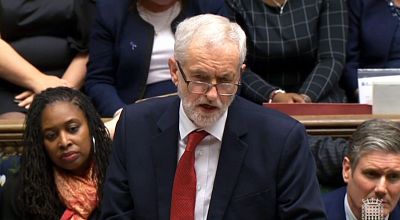Before this week, the biggest government loss in the British Parliament was by a margin of 166 votes and came in 1926. May smashed that record on Tuesday.
LONDON — Theresa May was clinging to her job Wednesday after her plan to leave the European Union suffered the biggest parliamentary defeat of any prime minister in British history.More than one-third of lawmakers from May's Conservative Party voted against her divorce proposal.Whilethe loss was widely expected, the scale of the rout — 432-202 — was not.
Opposition leader Jeremy Corbyn immediately triggered a vote which will allow lawmakers to say whether they have confidence in the prime minister's leadership. He said Parliament deserved a chance to give its verdict "on the sheer incompetence of this government."Despite not commanding a majority in Parliament, it appears that May will survive Wednesday's vote because the Democratic Unionist Party — a small Northern Irish group of lawmakers which props up the government — said they will support her.
May also survived an effort to oust her as head of the ruling Conservatives launched by rebels from within her own party last month.If May loses the looming no-confidence vote, then the government will fall. All political parties will have a 14-day period in which to form a new government in the 650-seat Parliament. If that doesn't happen, a general election would occur — which is Corbyn's preference.Before this week, the biggest government loss in Parliament was by a margin of 166 votes and came in 1926. May smashed that record, losing by a margin of 230.
Tuesday's defeat on Brexit came just 73 days before Britain's departure from the E.U. on March 29 and throws up a big question mark over what's next for the country.If May survives the no-confidence vote, she will return to Parliament with an alternative plan to leave the E.U. next week.But the prime minister has given little indication of what shape her next proposal might take. She will either have to attempt to renegotiate the deal with Brussels or the U.K. will face a "no-deal" scenario which would see Britain crash out of the bloc without a trade agreement, something most experts say would have a catastrophic consequences.
Shortages of food and medicine, civil unrest, chaos at ports and airports have all been touted as possibilities under a "no-deal" Brexit.There are also concerns for what Brexit means for the border between Northern Ireland, which is part of the U.K., and the Irish Republic, which is a separate country and will remain part of the E.U.
The border is currently more or less invisible and there are no checkpoints. Some fear the reinstatement of a physical boundary risks a return to "The Troubles," rekindling tensions that might spill over into violence. A 1998 peace deal ended decades of conflict.Leading Brexit campaigner Nigel Farage told broadcaster Sky News Wednesday that he thought Britain would likely be forced to delay the scheduled date for Brexit and that another referendum on the issue might be necessary to break the government gridlock."I think and I fear that we are headed on a path towards delay and probably, yes, a second vote," said Farage, who is a former leader of the pro-Brexit U.K. Independence Party.












